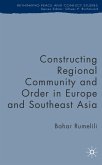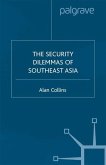Constructing International Security helps policy makers and students recognize effective third-party strategies for balancing deterrence and restraint in security relationships. Brett V. Benson shows that there are systematic differences among types of security commitments. Understanding these commitments is key, because commitments, such as formal military alliances and extended deterrence threats, form the basis of international security order. Benson argues that sometimes the optimal commitment conditions military assistance on specific hostile actions the adversary might take. At other times, he finds, it is best to be ambiguous by leaving an ally and adversary uncertain about whether the third party will intervene. Such uncertainty transfers risk to the ally, thereby reducing the ally's motivation to behave too aggressively. The choice of security commitment depends on how well defenders can observe hostilities leading to war and on their evaluations of dispute settlements, their ally's security and the relative strength of the defender. Constructing International Security helps policy makers and students recognize effective third-party strategies for balancing deterrence and restraint in security relationships. Benson demonstrates that understanding the systematic differences among types of security commitments is key, as they form the basis of international security order.
Hinweis: Dieser Artikel kann nur an eine deutsche Lieferadresse ausgeliefert werden.
Hinweis: Dieser Artikel kann nur an eine deutsche Lieferadresse ausgeliefert werden.
'In making alliance commitments to friendly but threatened states, how do states balance the need to credibly deter a potential aggressor while at the same time avoiding the moral hazard of encouraging risky behavior by the ally? When will a state opt for an ambiguous alliance commitment, and how does this strategic ambiguity affect the behaviors of the ally and the threatening state? Benson answers these questions by developing and testing a new theory of alliances and probabilistic commitment. Constructing International Security's substantive importance, theoretical rigor, and empirical sophistication make it required reading for all conflict theorists.' Jack S. Levy, Rutgers University








